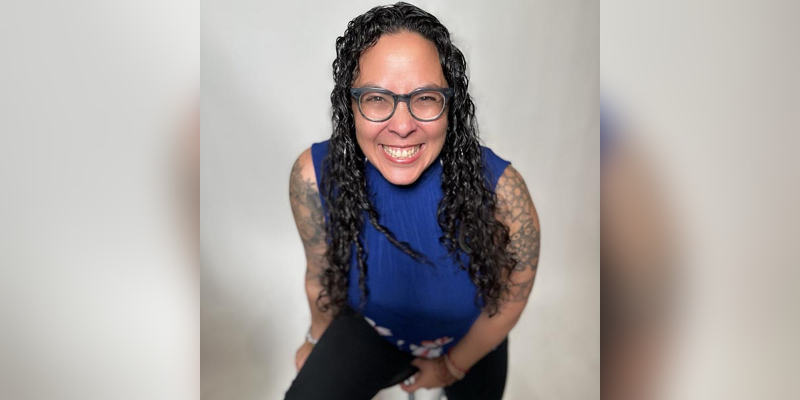
Time at Lehigh
Sicre was born in Ecuador and raised in Spain until she came to the U.S. at age 15. She was told that she wasn’t really college material. “As a woman of color and immigrant who spoke English as a second language and had learning disabilities, I could have believed my English teacher,” she says.
But she didn’t. She was recruited to Lehigh on an athletic scholarship for soccer and track. During her first year, she took an acting class with Augustine Ripa and was asked to audition. She was soon cast in two one-acts written by María Irene Fornés and directed by since-retired theatre professor Pam Pepper.
Sicre’s schedule was packed with morning classes, afternoon practices, and evening rehearsals. She was involved in many shows including Zora Neale Hurston’s Spunk and August Wilson’s Fences.
“Even back then, Lehigh produced a play by a Black artist every year. Today that feat alone is remarkable at a predominantly white institution,” she says. “But it demonstrates how Lehigh was on the cusp of representing the global majority.”
When she knew that her life after Lehigh was bound for a classroom, she applied for and was accepted as a Presidential Scholar. Rather than earn a master’s degree in her fifth year at Lehigh, she earned another bachelor’s degree in history. “Back then, if teaching in New York, you had to major in what you taught, and journalism and theater weren’t options,” she says.
After Lehigh
Sicre began to teach in New York City while earning a master’s degree in social studies at Columbia. She then went to Florida, teaching at an urban high school in North Miami. She started a theater program from scratch and within four years won the top prize at the Florida Theatre Conference, where high schools from across the state compete in a one-act festival.
“My students watched as other schools rolled in with expensive costumes and extensive sets while we had nothing,” she says. “It challenged them to get clear on their purpose and what it takes to succeed. The win meant so much to them.”
While teaching in Miami she earned her master’s in educational theater from NYU. She then entered the Ph.D. program at NYU and began her classwork and research while directing at many theaters and teaching at a variety of New York colleges. Balancing all of that took time, 10 years in fact, but it brought many amazing opportunities.
Career Highlight
It starts when James Earl Jones visited campus while she worked as stage manager on Fences at Zoellner. The win in Florida with her students is up there. So is serving as a culture consultant at Nickelodeon for shows and movies, and directing an outdoor pandemic performance of a LatinX version of Samuel Beckett’s classic Waiting for Godot.
Her research as well. She took a class on Blackness in Latin culture that changed the trajectory of her research, writing the first dissertation in the country on AfroLatinidad in U.S. theatres. She is now seen as its primary scholar following the publication of six book chapters.
Advice to your younger self
“I would say bet on yourself,” she says. “Lehigh took a bet on me. Lehigh gave me an opportunity, the confidence, and a foundation. I owe so much to Jack Lule, my journalism adviser, who fought for me and believed in me. I have never seen someone believe so deeply in me. He is a premier example of what a teacher should be. I still send him notes about my successes. Augustine Ripa in theater also believed in me. I love Lehigh and how it changed my life.”
What’s next?
A show she directed, La Egoista, winner of the 2022 National Latine Playwrights Award, just opened at the Skylight theater in Los Angeles. Days later she began directing a youth production at East West Players, the nation's first professional Asian American theater organization, that will tour area schools and community centers.
Spotlight Recipient

Daphnie Sicre ’98
Assistant professor, Loyola Marymount University; Journalism and Theatre Double Major with Minor in Education
